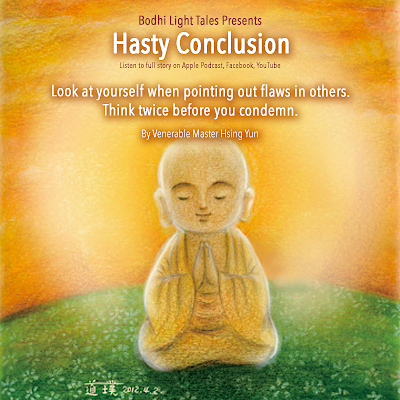Humble Table, Wise Fare
Good deeds show us the path of righteousness.
News
Hasty Conclusion
Find out what happened in this podcast episode: https://bit.ly/2QzgUJN
Once upon a time, there lived two government officials, Feng Dao (馮道) and He Ning (和凝) during the time of the Five Dynasties and Ten Kingdoms. They both worked for the Zhongshu Province and were very good friends. They would visit each other often, enjoying freshly brewed tea and chatting for hours.
One day, Feng Dao went to see He Ning at his house.
“Hi! Please come in!” He Ning greeted Feng Dao as he walked in.
He Ning couldn’t help notice his friend’s new shoes. He said, “You got new shoes!”
“Yes! Aren’t they nice?” Feng Dao happily replied.
When He Ning looked at the shoes again, he thought to himself, “These shoes look so familiar?...Wait...they are exactly the same pair I bought the other day?”
While the attendant was serving tea, He Ning asked Feng Dao, “So, how much did you pay for your new shoes?”
Feng Dao raised his right foot, pointing at the shoe, and said, “Oh...this one? I paid $900!”
All of a sudden, He Ning slammed his hands on the table, then pointed at his attendant, and yelled at him, “Why did you lie to me and tell me that you paid $1800 for my shoes which are exactly the same?”
Before the attendant could reply, Feng Dao lifted his left foot, pointing at the shoe, and calmly said, “This one also cost me $900.”
“What are you talking about? What do you mean that one also cost you $900?” He Ning asked, now furious.
“You asked me how much I paid for my new shoes, right? So this one, the right one, is $900, and the other one, the left one, is also $900. Therefore, together as a pair, I paid a total of $1800.” Feng Dao replied, lifting both his feet.
“Why do you mock me like that? Do you think this is funny?” He Ning asked.
“I am not mocking you. You are angry because you are impatient and hot-tempered. You barely heard the first half of my answer to your question and you were already enraged. If you had simply waited for the second half of my answer and heard me out, you would not have come to such a hasty and wrong conclusion.”
He Ning, now feeling highly embarrassed, realized it was his bad temper and short duse that caused the misunderstanding. He felt wretched and ashamed for having wrongly accused his attendant, and said, “Please forgive me for doubting and accusing you.”
His attendant replied, “It is okay. I know that you simply lashed out because you were angry. You realized your mistake and apologized. Please think no more of it.”
Seeing the two make amends, Feng Dao said to the attendant, “I can sell both my shoes to you for $900 if you wish to have a pair!” They all laughed together and the tension due to the situation was finally gone.
This story highlights how jumping to conclusions and knee-jerk reactions frequently lead to misunderstandings and disputes. Often, as a result, we not only hurt others but ourselves as well. In this story, He Ning’s foolhardy reaction caused him to doubt and falsely accuse his attendant. Furthermore, he even accused his best friend of openly mocking him. In the heat of the moment, he was unable to control his emotions. This loss of control was the result of his lack of judgment in understanding the context of the situation, and his lack of patience in making sure that he had all the facts before jumping to a hasty conclusion. When we are faced with such situations, it is important to reflect on how we usually respond to them. Can we be humorous and witty like Feng Dao? Or are we as foolhardy and rash as He Ning?
For every situation, before we make a judgment or decision, we must take our time to think, consider, and assess the details as well as context. We must endeavor to see all situations as they are, not as we want or imagine them to be. If He Ning had been able to think about the situation differently, for example, being happy that his friend had been able to get the same shoes at a discount, the outcome would have been very different.
Too often, we are too hasty in making assumptions and impulsive in our reactions. In many cases, we do not even take the time to properly assess and clarify what is going on. As the saying goes, “Think twice before you act.” Only by staying calm, observing, and assessing the situation before taking any action can we avoid making a wrong decision and progress towards achieving an ideal outcome.
Just as Venerable Master Hsing Yun says,
“Look at yourself when pointing out flaws in others.
Think twice before you condemn.”
OTHER LINKS:
OTHER LINKS:





